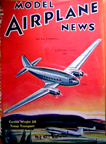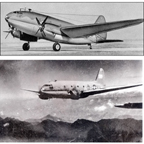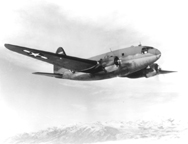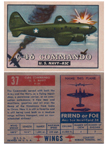August, 1941

Curtiss-Wright CW-20/C-46 "Commando"
Model Airplane News Cover Art for August, 1941
by Jo Kotula
Click to Enlarge
The Curtiss-Wright C-46 Commando was a transport aircraft originally derived from a commercial high-altitude airliner design. It was instead used as a military transport during World War II by the United States Army Air Forces as well as the U.S. Navy/Marine Corps under the designation R5C. Known to the men who flew them as "The Whale," or the "Curtiss Calamity." Tthe C-46 served a similar role as its counterpart, the Douglas C-47 Skytrain, but was not as extensively produced


George Page Design Patent D-136,100
Click to Enlarge
The Curtiss CW-20 was designed in 1937 by George A. Page Jr., the chief aircraft designer at Curtiss-Wright. The CW-20 was intended as a private venture intended to introduce a new standard in pressurized airliners. The CW-20 had a patented fuselage conventionally referred to as a "figure-eight" (or "double-bubble") which enabled it to better withstand the pressure differential at high altitudes. This was done by having the sides of the fuselage creased at the level of the floor that not only separated the two portions but shared in the stress of each, rather than just supporting itself. The main spar of the wing could pass through the bottom section which was mainly intended for cargo without intruding on the passenger upper compartment.


Curtiss-Wright CW-20/C-46 "Commando"
Click to Enlarge
Most famous for its operations in the China-Burma-India theater (CBI) and the Far East, the Commando was a workhorse in flying over the "The Hump" (as the Himalaya Mountains were nicknamed by Allied airmen), transporting desperately needed supplies to troops in China from bases in India and Burma. A variety of transports had been employed in the campaign, but only the C-46 was able to handle the wide range of adverse conditions encountered by the USAAF. Unpredictably violent weather, heavy cargo loads, high mountain terrain, and poorly-equipped and frequently flooded airfields proved a considerable challenge to the transport aircraft then in service, along with a host of engineering and maintenance nightmares due to a shortage of trained air and ground personnel. After a series of mechanical gremlins were resolved, the C-46 proved its worth in the airlift operation. It could carry more cargo higher than other Allied twin-engine transport aircraft in the theater, including light artillery, fuel, ammunition, parts of aircraft and, on occasion, livestock. Its powerful engines enabled it climb satisfactorily with heavy loads, staying aloft on one engine if not overloaded, though "war emergency" load limits of up to 40,000 lbs often erased any safety margins.
Here is a video of the Curtiss-Wright CW-20/C-46 "Commando" in action:
In addition to the cover of Model Airplane News, this airplane was also featured in the WINGS "Friend or Foe" trading card series of the early 1950s

Trading card representation of the Curtiss-Wright CW-20/C-46 "Commando"
Click Here to see all 200 cards in the series
Click to Enlarge
Click Here for more information about the Curtiss-Wright CW-20/C-46 "Commando".

Click to go back and select another cover.
Counter for the Entire Site (not just this page..)
Home | About Lindy | Last Week's Reviews | Upcoming Events | 1940s Collecibles
The Guide - Establishments - Travel - Accessories
Music | Links | Photo Gallery | Extras | Contact